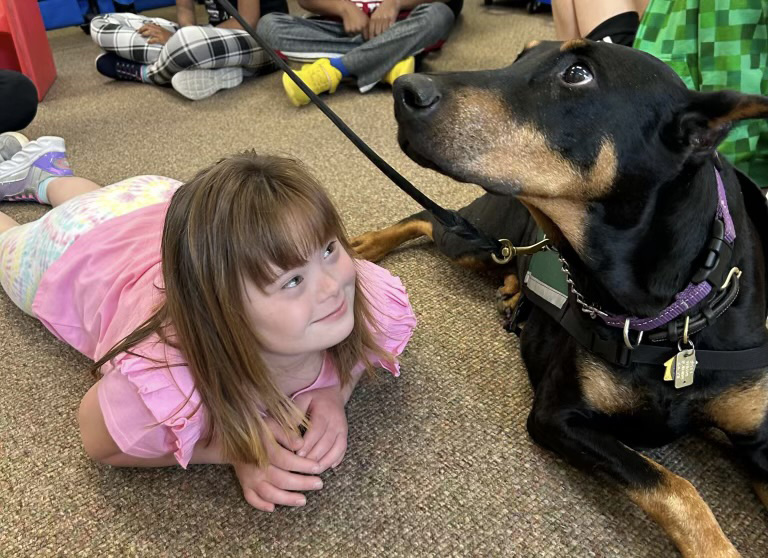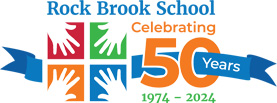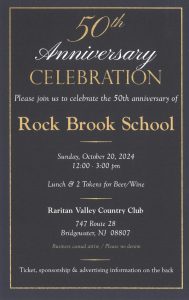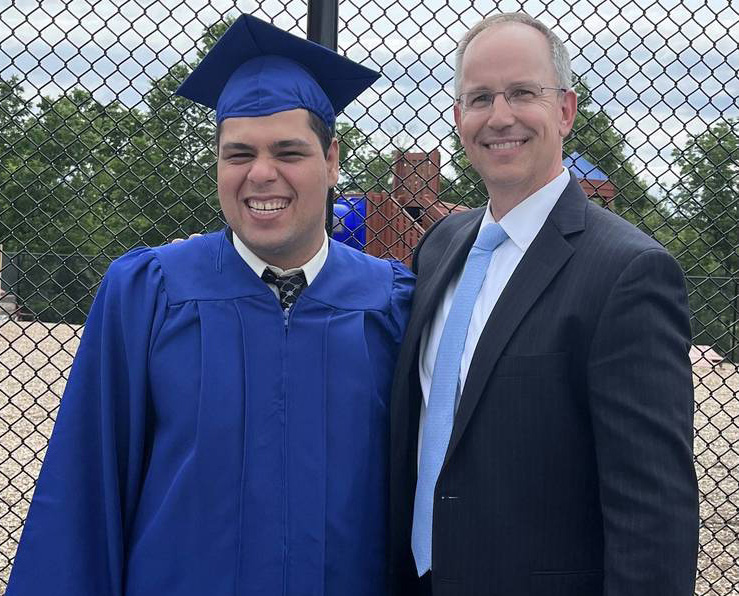By Thomas Connolly, Principal

Students at Rock Brook School in Skillman had the opportunity to meet and interact with some furry friends last school year and are looking forward to continuing this wonderful program in the 2023-2024 school year.
Spearheaded by Bob Hegedus, Director of Curriculum and Instruction, The Attitudes in Reverse (AIR) Therapy Dog program has proven to support our students, staff, and community regarding social and emotional well-being. Bob Hegedus stated, “Therapy dogs have been providing assistance to people for well over 100 years. The support that the dogs have provided began with individuals in nursing homes, retirement communities and medical facilities. In recent years therapy dogs have begun to spend time in schools to help students with learning disabilities. Tricia Baker, who established the Attitudes in Reverse (AIR) Therapy Dog program in 2010 reported in a news article that it wasn’t until about 30 years ago that scientists began to conduct studies about dogs and the effects that they had on humans. They knew that dogs made people feel better, but they didn’t understand the physiological impact on the body. They soon realized that contact with a dog releases “feel good brain chemicals” that promote a sense of well-being and improves the overall mental and physical health of an individual. Tricia Baker added that the AIR Dogs Therapy program makes the most of these scientific facts in helping to create a safe, friendly and secure environment.
Throughout the course of the year, students and staff had opportunities to meet with two dogs for up to an hour. Some of the special therapy dogs who visited the school included Alice, McKenly, and Nomie. Each month, classes would gather and students and staff had the chance to learn about the dog as shared by the dog handler. They would discuss the breed of the dog, age, and daily activities the dog would participate in. The dog handler would then provide numerous opportunities for the students to pet and sit next to the dog, while other students observed the positive interactions. At the conclusion of the session, the students were provided with a picture of the dog including interesting facts about the dog such as birthday and favorite foods.
The primary focus of AIR is to promote messages of understanding, empathy, and kindness towards others. In addition, there are many potential benefits of having therapy dogs in school. This includes:
- Provides a calming effect on students and reduces stress
- Improves concentration, self-confidence, and self-esteem
- Increases level of motivation to learn
- Improves academic skills
- Builds trust and a sense of security
- Provision of unconditional acceptance
- Encourages respect and therefore improves relationships amongst students and staff
- Reduces anxiety and elevates mood and temperament
- Promotes character traits, such as cooperation, gratitude, nurturance, patience, and responsibility
Thomas Connolly, Principal of Rock Brook School, shared, “This program has been such a positive experience for our school community. We are looking forward to continuing this incredible program for our students and staff.” Additionally, Thomas Connolly stated, “Seeing our students interact, communicate, and smile while they are with the therapy dogs is absolutely wonderful.”
Rock Brook School is a private, non-profit school for communication impaired and multiply disabled children, ages 3 through 21. Located in Skillman, Rock Brook School is approved by the New Jersey State Department of Education and is recognized as a School of Excellence by the National Association of Special Education Teachers (NASET). The school is accredited by the Middle States Commission on Elementary Schools (MSCES). Currently, the school serves over 50 students from 25 school districts in New Jersey.




 By Thomas Connolly
By Thomas Connolly By Thomas Connolly
By Thomas Connolly By Thomas Connolly
By Thomas Connolly By Thomas Connolly
By Thomas Connolly

